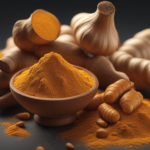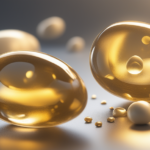In the realm of natural health supplements, berberine stands out as a powerful and effective compound with a range of benefits, particularly for those looking to manage blood sugar levels and improve metabolism. Derived from various plants, including the goldenseal, barberry, and Oregon grape, berberine has been used in traditional medicine for centuries. Today, modern research backs up its potential as a natural supplement that can significantly impact blood sugar control and metabolic health. In this article, we’ll explore the benefits of berberine, how it works, and how it can be incorporated into your health routine.
What Is Berberine?
Berberine is an alkaloid compound extracted from several plants, primarily from the Berberis species. It has a long history of use in traditional Chinese and Ayurvedic medicine, where it was employed to treat various ailments, including infections, digestive issues, and inflammatory conditions. In recent years, berberine has gained attention for its remarkable ability to regulate blood sugar levels and enhance metabolic function, making it a popular choice for those managing diabetes, prediabetes, and metabolic syndrome.
How Does Berberine Work?
Berberine works at a cellular level, influencing a variety of biological mechanisms that contribute to its health benefits. Here’s how it impacts blood sugar control and metabolism:
1. Activates AMPK (Adenosine Monophosphate-Activated Protein Kinase)
AMPK is often referred to as the “metabolic master switch.” It plays a critical role in regulating metabolism, energy production, and glucose uptake. Berberine activates AMPK, which helps to increase insulin sensitivity, enhance glucose uptake by cells, and reduce the production of glucose in the liver. This leads to lower blood sugar levels and improved metabolic health.
2. Improves Insulin Sensitivity
Insulin resistance is a key factor in the development of type 2 diabetes and metabolic syndrome. By improving insulin sensitivity, berberine makes it easier for the body to regulate blood sugar levels, reducing the risk of blood sugar spikes and maintaining more stable glucose levels throughout the day.
3. Reduces Glucose Production in the Liver
The liver plays a significant role in blood sugar regulation by producing glucose through a process called gluconeogenesis. Berberine helps to inhibit this process, leading to a decrease in overall glucose production and a reduction in fasting blood sugar levels.
4. Supports Weight Loss
Berberine has been shown to support weight loss, particularly in individuals with metabolic syndrome. By improving insulin sensitivity and activating AMPK, berberine can help the body burn fat more effectively and reduce fat storage, particularly in the abdominal area. This, in turn, supports better metabolic health and further enhances blood sugar control.
5. Lowers Cholesterol Levels
In addition to its effects on blood sugar and metabolism, berberine has been found to lower LDL cholesterol and triglyceride levels, which are often elevated in individuals with metabolic syndrome and type 2 diabetes. By improving lipid profiles, berberine contributes to better cardiovascular health and reduces the risk of heart disease.
Benefits of Berberine for Blood Sugar Control
Berberine offers several benefits for those looking to manage their blood sugar levels naturally. Here are some of the key advantages:
1. Effective for Type 2 Diabetes
Research has shown that berberine is as effective as some pharmaceutical drugs in lowering blood sugar levels in individuals with type 2 diabetes. It works by lowering fasting blood glucose levels, reducing hemoglobin A1c (a marker of long-term blood sugar control), and improving insulin sensitivity.
2. Helps with Prediabetes Management
For individuals with prediabetes, berberine can be an effective tool for preventing the progression to full-blown diabetes. By improving insulin sensitivity and reducing fasting glucose levels, berberine helps to keep blood sugar levels in check and reduce the risk of developing type 2 diabetes.
3. Reduces Post-Meal Blood Sugar Spikes
One of the challenges in managing blood sugar is controlling the spikes that occur after meals. Berberine has been shown to reduce postprandial blood sugar levels, helping to maintain more stable glucose levels throughout the day and reducing the risk of complications associated with high blood sugar.
4. Supports Healthy Weight Management
As mentioned earlier, berberine can aid in weight loss, which is crucial for individuals with type 2 diabetes and metabolic syndrome. By supporting healthy weight management, berberine helps to reduce the strain on the body’s insulin system and promotes better overall metabolic health.
How to Use Berberine
When incorporating berberine into your health routine, it’s important to use it correctly to maximize its benefits. Here’s how to do it:
1. Recommended Dosage
The typical dosage of berberine for blood sugar control and metabolic health is 500 mg taken two to three times per day, usually before meals. This dosage has been shown to be effective in numerous studies. However, it’s important to consult with a healthcare provider before starting any new supplement, especially if you have existing health conditions or are taking medications.
2. Potential Side Effects
While berberine is generally safe for most people, some may experience mild side effects such as digestive discomfort, constipation, or diarrhea. These side effects are often temporary and can be minimized by starting with a lower dose and gradually increasing it. If side effects persist, it’s best to consult with a healthcare provider.
3. Interactions with Medications
Berberine can interact with certain medications, including those for diabetes, high blood pressure, and blood thinners. If you are taking any prescription medications, it’s crucial to speak with your healthcare provider before adding berberine to your routine to avoid potential interactions.
Natural Sources of Berberine
While berberine supplements are the most concentrated form of this compound, it can also be found in certain plants and herbs. Here are some natural sources of berberine:
1. Goldenseal (Hydrastis canadensis)
Goldenseal is a North American herb traditionally used for its antimicrobial properties. It contains high levels of berberine and can be found in various herbal supplements.
2. Barberry (Berberis vulgaris)
Barberry is a shrub that produces red berries and is commonly used in traditional medicine. Its roots and bark are rich in berberine, making it a natural source of this powerful compound.
3. Oregon Grape (Mahonia aquifolium)
Oregon grape is another plant rich in berberine. It is often used in herbal medicine for its anti-inflammatory and antimicrobial properties.
4. Phellodendron (Phellodendron amurense)
Phellodendron, also known as Amur cork tree, is used in traditional Chinese medicine and is a good natural source of berberine.
Q&A: Frequently Asked Questions
Q1: Can berberine be taken with other supplements for blood sugar control?
A1: Yes, berberine can be taken alongside other supplements like magnesium, cinnamon, and alpha-lipoic acid, which also support blood sugar control. However, it’s important to consult with a healthcare provider before combining supplements.
Q2: How long does it take to see results from berberine?
A2: Some people may begin to notice improvements in blood sugar levels within a few weeks of starting berberine, while others may take longer. Consistent use is key to achieving the best results.
Q3: Can I use berberine if I’m on diabetes medication?
A3: Berberine can interact with diabetes medications, potentially enhancing their effects and leading to low blood sugar (hypoglycemia). It’s crucial to consult with your healthcare provider before adding berberine to your regimen.
Q4: Are there any foods or drinks that can enhance the effects of berberine?
A4: Consuming a balanced diet that includes fiber-rich foods, lean proteins, and healthy fats can help enhance the effects of berberine. Avoiding high-sugar and high-carb foods is also beneficial for maintaining stable blood sugar levels.
Q5: Is berberine safe for long-term use?
A5: Berberine is generally considered safe for long-term use, but it’s important to monitor your health and consult with a healthcare provider regularly. Taking breaks from supplementation every few months may also be recommended to assess its ongoing need.
















